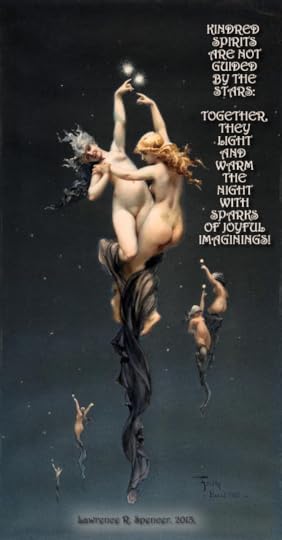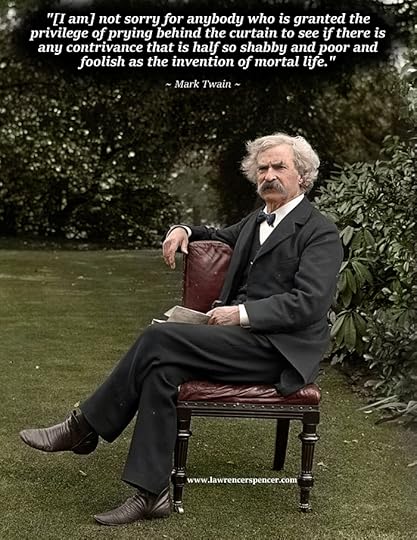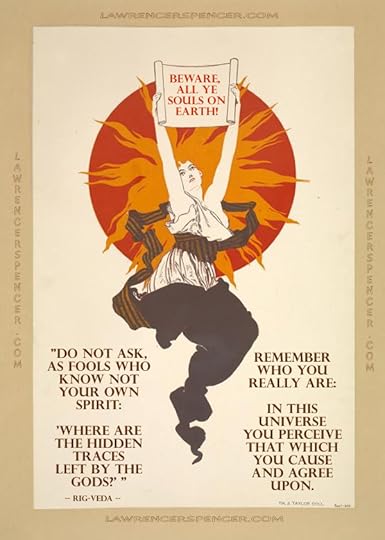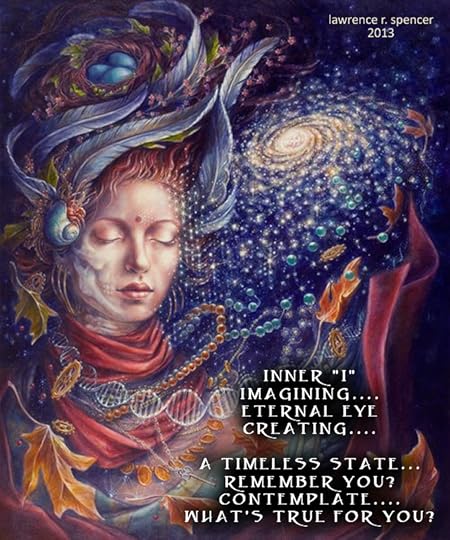Lawrence R. Spencer's Blog, page 364
March 10, 2018
AGREEMENT
“DOESN’T ANYBODY BELIEVE ME?
“Doesn’t anybody believe me?“–Dorothy
“Of course we believe you, Dorothy…“–Uncle Henry in ‘The Wizard of Oz’
Is reality really real?
As Dorothy discovered when she returned back to Kansas, her friends and family did not agree that the Land of Oz was “reality”.
Conversely, gaining agreement from one’s friends does not guarantee that the information agreed upon is true or workable or survival. Agreement is not necessarily reality. Although Man seems to crave agreement with his fellows, the fact that “everyone agrees that the world is flat” or that “the sun revolves around the Earth”, does not make it a reality.
History has shown that agreements among people have very frequently proven to be disastrous.
Example: Adolph Hitler gained the complete, unabated agreement of the majority of the German population before he led them into total self-destruction.
Lots of people agree when fast food franchise advertisements tell them that cheeseburgers, fries and milk shakes are good for them. We were, and still are, told, based on “medical research” that these foods contain nutrients from all the “four basic food groups”. This doesn’t change the fact that you get fat, develop hardened arteries and die an early death from heart disease or cancer if you keep eating cheeseburgers, fries and shakes.
 The unprecedented multi-billion dollar profit margins earned by the beef and dairy industry and sugar growers in cooperation with the fast food restaurant cartels have a heavy influence on “truth in advertising”. In addition, the quality of information we receive, as consumers, from the American Medical Association regarding “the science of nutrition” is directly influenced by fast food commercial interests.
The unprecedented multi-billion dollar profit margins earned by the beef and dairy industry and sugar growers in cooperation with the fast food restaurant cartels have a heavy influence on “truth in advertising”. In addition, the quality of information we receive, as consumers, from the American Medical Association regarding “the science of nutrition” is directly influenced by fast food commercial interests.
Only one generation ago the Japanese people were nearly free of heart disease and cancer. In just 20 short years, since they have openly adopted the Standard American Diet (SAD)–cheeseburgers/French fries/milk shakes and liquid caffeine-filled sugar water called cola–the incidence of heart disease and cancer among the Japanese people has skyrocketed. The Japanese agreement with Western lifestyles is killing them.
Reality is often heavily influenced by the Oz Factor of agreement. Agreements influence our perception of reality. A child’s perception of his environment, his religious and political ideas and viewpoints about people are often heavily influenced by agreement with his mother and father.
Be cautious with whom you agree. Carefully examine ideas and information before you agree. Just because the preacher says, “sex is evil” or the President says, “I’m not a crook”, does not make it reality.
Be careful about agreeing with Wicked Witches and Wizards who promote unworkable solutions. By your own observation decide what is real in the Physical Universe and in Your Own Universe. Your reality is based on your agreements.”
Download the Audiobook from Audible.com
Originally posted 2013-08-11 19:48:33. Republished by Blog Post Promoter
KINDRED SPIRITS
Love and Creativity are Feminine Qualities that define The Soul. The physical universe is antipathetic to Love. Ignore it. Continue to Love and Create.

(Painting by Luis Ricardo Falero, 1881)
___________________________________________
“KINDRED SPIRITS ARE NOT GUIDED BY THE STARS:
TOGETHER, THEY LIGHT AND WARM THE NIGHT WITH SPARKS OF JOYFUL IMAGININGS!”
Lawrence R. Spencer. 2013.
Originally posted 2013-01-09 00:16:46. Republished by Blog Post Promoter
March 9, 2018
BEHIND THE CURTAIN
March 8, 2018
SACRED WOMEN
I recently discovered that my Great, Great, Great, Great, Great Grandmother is Molly Brandt (1735 – 1796), the sister of a Mohawk Indian Chief. I am honored to consider myself, at least in small part physically, and as a Spiritual Being, a Native of American. Here is an article about her on Wikipedia — http://en.wikipedia.org/wiki/Molly_Brant
Originally posted 2013-06-14 14:28:46. Republished by Blog Post Promoter
March 7, 2018
CUTE SLEEPING
CUTE SLEEPING…..
CUTE SLEEPING WITH YOUR BFF!
Originally posted 2013-05-19 12:17:45. Republished by Blog Post Promoter
SHERLOCK HOLMES Personal Memoir Chapter One

CHAPTER 1: CHARLES OF CHRIST CHURCH
“When I first arrived in the great city, I had neither kith nor kin in England, and was therefore as free as air — or as free as an income of eleven shillings and sixpence a day will permit a man to be. Under such circumstances I naturally gravitated to London, that great cesspool into which all the loungers and idlers of the Empire are irresistibly drained. There I stayed for some time at a private hotel in the Strand, leading a comfortless, meaningless existence, and spending such money as I had, considerably more freely than I ought.”, I thought to myself.
It was a cold morning of the early spring. We sat after breakfast upon either side of a cheery fire in the old room at Baker Street. A thick fog rolled down between the lines of dun-colored houses, and the opposing windows loomed like dark, shapeless blurs through the heavy yellow wreaths. Our gas was lit and shone on the white cloth and glimmer of china and metal, for the table had not been cleared yet.
As neither Dr. Watson, or myself, had any other pressing matters before us, and no prospect of employment to enhance either my interest or livelihood, we spent the afternoon perusing the London Times. I read nothing except the criminal news and the agony column. The latter is always instructive, most particularly in the observation that violence does, in truth, recoil upon the violent, and the schemer falls into the pit which he digs for another.
Our original acquaintance, when I had been lodged on Montague Street, around the corner from the British Museum, was on Saturday, July 16th. I had spent the day working in the chemical laboratory at St. Bart’s Hospital. In the morning, I complained to a young medical man named Stamford about not being able to find someone to go halves on some nice rooms I had found in Baker Street.
That very afternoon Stamford brought Dr. Watson into the lab to inquire about sharing the rooms. The next day Watson and I went around together to inspect our potential domicile at 221B Baker Street. We made our arrangements then and there with Mrs. Hudson, the landlady. Watson began moving in that night, and I the next morning, Monday, July 18th.
Dr. Watson represented himself to me as having served as an Assistant Surgeon of the Army Medical Department, which was attached to the 66th Berkshire Regiment of Foot in Afghanistan. He related to me that he was discharged following an injury received in the line of duty during the infamous British defeat at the Battle of Maiwand, in July of the previous year. Watson related that he was nearly killed in the long and arduous retreat from the battle, but was saved by his orderly, Murray, who threw the doctor on a pack-horse and thus helped to ensure his escape from the field.
Watson is strongly built, of a stature either average or slightly above average, with a thick, strong neck, owing to the fact that he was once an athlete, whom, although a Scot who was educated at the University of Edinburgh, played rugby for Blackheath in south-east London.
I spent nearly half an hour lighting and relighting my pipe while Dr. Watson shuffled through the tabloid pages, grunting occasionally at one trivial report or another.
“I was never a very sociable fellow, Watson, always rather fond of moping about in my rooms”, I complained in a melancholy tone.
Watson grunted impassively from behind the unfolded sheets of the newspaper with little regard for anything other than the distraction provided by a river of typographical trivialities many men frequently employ to dull their empathy. I will admit that I have most certainly included myself amoung their number on numerous occasions.
Apparently the dampness of my environs had affected my personal blend of Latakia and Cavendish tobaccos, which I have relished as a flavor more pleasing than the finest culinary delicacies of Paris for many years. Ordinarily, the heat retained by the fine meerschaum bowl of my pipe was sufficient to dry the mixture enough to keep it well lit. In any case, matches are plentiful and cheap. Suitable pipe tobacco is not.
For some years Watson had taken it upon himself to create adventure stories based upon my criminal investigations, which, upon several occasions, he had accompanied me at my request. Most frequently, I asked for his assistance when the matter at hand presented a feature of menace which may have required fire arms. For this purpose Dr. Watson seemed inevitably prepared, bearing his service revolver in his pocket, should the occasion for the use of it present itself. Indeed, I presumed without justification, that his military service qualified him as a proven marksman, though, in point of fact, as an assistance surgeon, he had never fired a gun in defense of his country or himself.
My review of his written accounts of our adventures did not meet with my satisfaction upon any occasion. After reading a few of them I chose to ignore them more frequently than not, demurring of his insistence upon sensationalizing the science of logic and observation which were the only features of my investigations worthy of note, in my own opinion.
I had been silent all the morning, dipping continuously into the advertisement columns of a succession of papers in search of items of professional interest. Having reflected upon the subject of his scribbling as I researched the morning papers, with fruitless result, I emerged in no very sweet temper to lecture him upon his literary shortcomings.
“To the man who loves art for its own sake”, I remarked, tossing aside the advertisement sheet of the Daily Telegraph, “it is frequently in its least important and lowliest manifestations that the keenest pleasure is to be derived. It is pleasant to me to observe, Watson, that you have so far grasped this truth that in these little records of my cases which you have been good enough to draw up, and, I am bound to say, occasionally to embellish, you have given prominence not so much to the many causes celebres and sensational trials in which I have figured but rather to those incidents which may have been trivial in themselves, but which have given room for those faculties of deduction and of logical synthesis which I have made my special province.”
“And yet,” said Watson smiling, “I cannot quite hold myself absolved from the charge of sensationalism which has been urged against my records.”
I took up a glowing cinder from the fireplace with tongs and lighted with it my long cherry-wood pipe. I smoked this when I was inclined to a cooler and sweeter smoke than that provided by my briar pipes.
“You have erred in attempting to put color and life into each of your statements instead of confining yourself to the task of placing upon record that severe reasoning from cause to effect which is really the only notable feature about the thing”, I said, puffing ringlets of smoke into the air which merged and gently dissipated upon the ceiling.
“It seems to me that I have done you full justice in the matter,” Watson remarked with some coldness.
“It is not a matter of selfishness or conceit” said I, answering, as was my wont, to his thoughts rather than his words. “If I claim full justice for my art, it is because it is an impersonal thing — a thing beyond myself. Crime is common. Logic is rare. Therefore it is upon the logic rather than upon the crime that you should dwell. You have degraded what should have been a course of lectures into a series of adventure tales.”
“At the same time,” I remarked after a pause, during which I had sat puffing at my pipe and gazing down into the fire, “you can hardly be open to a charge of sensationalism, for out of these cases which you have been so kind as to interest yourself in, a fair proportion do not treat of crime, in its legal sense, at all. The small matter in which I endeavored to help the King of Bohemia, the singular experience of Miss Mary Sutherland, the problem connected with the man with the twisted lip, and the incident of the noble bachelor, were all matters which are outside the pale of the law. But in avoiding the sensational, I fear that you may have bordered on the trivial.”
“The end may have been so,” he answered, “but the methods I hold to have been novel and of interest.”
“Pshaw. My dear fellow, what do the public, the great unobservant public, who could hardly tell a weaver by his tooth or a compositor by his left thumb, care about the finer shades of analysis and deduction?! But, indeed, if you are trivial I cannot blame you, for the days of the great cases are past”, I said with an earnestly disheartened conviction.
“Man, or at least criminal man, has lost all enterprise and originality. As to my own little practice, it seems to be degenerating into an agency for recovering lost lead pencils and giving advice to young ladies from boarding-schools. I think that I have touched bottom at last.”, I said in a black, disgruntled mood.
For some considerable time we sat wrapped in silence. I contemplated the flickering embers of the fire, intrigued by the inexplicable, spontaneous conversion of matter into energy for which no reasonable explanation had ever been offered by any of the great minds of science or philosophy.
Watson continued rattling and shuffling through a pile of papers which I had already discarded with overwhelming disinterest. There was seldom much of any interest to me in the press, unless it reported upon some incident or situation which offered a game of investigation to me.
After some little while, Watson reported to me that he had chanced upon a curious article concerning the mysterious disappearance of a young girl.
“Have you already read it?”, he inquired.
“No, I cannot say that I recall it. If there is a feature about it that strikes you as being of singular interest, perhaps you will be kind enough to share it with me”, I said.
According to the report, he summarized, a female child of about ten years was reported missing for several hours by her two siblings and a professor of mathematics, currently at Oxford, while enjoying a Sunday outing along the river Thames. The girls, when interviewed, stated that their sister, Alice Liddell, had been chasing a white rabbit, and had apparently followed it down a rabbit hole and disappeared beneath an enormous elm tree! The child remained missing for several hours.
Watson read the section of the report which specified certain details of the case he thought I might find relevant, as follows:
“April 19th. The Reverend Charles Lutwidge Dodgson and the Reverend Robinson Duckworth rowed in a boat up the River Thames with three young girls: Lorina Charlotte Liddell (aged 13), Alice Pleasance Liddell (aged 10)and Edith Mary Liddell (aged 8). The three girls are the daughters of Henry George Liddell, the Vice-Chancellor of Oxford University and Dean of Christ Church as well as headmaster of Westminster School. The journey had started at Godstow, a hamlet on the River Thames northwest of the centre of Oxford.”
“Naturally”, Watson said, paraphrasing the report, “the family of the child, upon news of the incident, were highly distressed. The professor in question, a Mr. Dodgson, has not been detained by authorities, but several unnamed persons have asserted suspicion of pedophilia against this man!” Watson paused as he completed reading the remaining portion of the article.
“How very curious”, he remarked, placing the paper next to his chair, and pulling out his own smoking pipe, tobacco and tools. “The siblings of the child insist that all parties involved are entirely innocent. They assert that their sister is at fault for chasing a strange rabbit. Indeed, they claimed that the rabbit was wearing a waistcoat, and examining a pocket watch when they last saw it!
Furthermore, the child in question, Alice, when questioned by the press, stated emphatically that much ado was being made of nothing, and that the entire incident was merely a story conjured by Mr. Dodgson as an innocent amusement! Certainly, the entire matter is nothing more than a sensational hoax, perpetrated by the Times editor as an attraction to gullible persons to read the paper. Typical behavior of the press! Reprehensible, I should say” , he concluded.
I pondered and smoked over the matter for several moments, mesmerized by droplets of rain streaming down the panes of glass which faced westward from my upstairs rooms at 221 B Baker Street.
“Certainly”, I observed to Watson, “this report demonstrates that the magistrates investigating the case are mentally incompetent. The family, powerless to press charges in the matter, as there is no evidence of foul play, and no harm having been done, are powerless to prosecute.”
Nevertheless, I seized upon this peculiar report as an opportunity to busy myself with a new investigation. My curiosity pressed me to make an inquiry with the constabulary under whose jurisdiction the matter had been attended.
However, before turning to those moral and mental aspects of the matter which present the greatest difficulties, I reminded myself, the inquirer must begin by mastering more elementary problems. After all, it is a capital mistake to theorize before you have all the evidence. It biases the judgment. To that end I posted a telegram that very afternoon to the constabulary at Oxford to whom I was known personally through our cooperation upon several cases in that area.
The following morning I received a reply from which I discovered that Mr. Dodgson was a bachelor Anglican clergyman. Moreover, and most importantly, a comfortable livelihood was provided him through his talent as a mathematician, which had won him the Christ Church Mathematical Lectureship.
No formal charges had been filed against Mr. Dodgson or Reverend Robinson Duckworth by the girl’s father, the Vice-Chancellor. However, the telegram implied that the inferred scandal of sexual indiscretion fomented by the newspaper report remained a topic of discussion upon the campuses of the university as well as in the community at large, and had alerted the constabulary to maintain an informal interest in the matter.
Contrasted with this supplemental information, the scandalous implications regarding his behavior, as described in the Times report, were becoming more intriguing to me by the moment! The most singular feature of the case, for me, was not the possibility of indiscretion but rather that no further mention whatever had been made of the rabbit!
Having no further information available to me, and disdaining contact with the press, as was my usual practice, I determined that my most effective method of investigation was to go around to visit professor Dodgson at his offices at Christ Church.
As for the matter of Mr. Dodgson’s integrity, rather than assuming that an impropriety might have occurred, it seemed more likely to me that his ignorance was as remarkable as his knowledge. As a mathematician he is undoubtedly astute, given his position as a professor. However, an unmarried man of his position should most certainly understand that his culpability for the temporary disappearance of this child placed him at the greatest risk socially! The penchant for society to persecute such a person, even a clergyman, in the absence of evidence of his innocence, is certainly a matter of gravity, if not sensibility.
I might easily have dismissed the matter entirely if it were not for an abiding curiosity on my part to reconcile the singular incongruities in the report. How could a young girl, and not her siblings, disappear down a rabbit hole for several hours, having been observed, reportedly, in pursuit of a rabbit wearing a waistcoat and possessing a pocket watch? Further, why would the children assert that the incident was merely a story conjured by Mr. Dodgson for their amusement, when the adults in attendance at the scene treated the matter with so much earnestness that the police and press were summoned?
— END OF CHAPTER ONE —
—
Read Chapter Two here: http://lawrencerspencer.com/2011/01/22/sherlock-holmes-my-life-chapter-two/
Originally posted 2011-01-08 20:59:36. Republished by Blog Post Promoter
March 6, 2018
VEDIC HYMNS
“When the Domain Force brought the Vedic Hymns [i] (Footnote) to the Himalayas region 8,200 years ago, some human societies already existed. The Aryan people invaded and conquered India [ii] (Footnote) , bringing the Vedic Hymns [iii] (Footnote) to the area.
The Vedas were learned by them, memorized and carried forward verbally for 7,000 years before being committed to written form. During that span of time one of the officers of The Domain Expeditionary Force was incarnated on Earth as “Vishnu” [iv] (Footnote). He is described many times in the Rig-Veda. He is still considered to be a god by the Hindus. Vishnu fought in the religious wars against the “Old Empire” forces. He is a very able and aggressive IS-BE as well as a highly effective officer, who has since been reassigned to other duties in The Domain.
This entire episode was orchestrated as an attack and revolt against the Egyptian pantheon installed by “Old Empire” administrators. The conflict was intended to help free humankind from implanted elements of the false civilization that focused attention on many “gods” and superstitious ritual worship demanded by the priests who “managed” them. It is all part of the mental manipulation by the “Old Empire” to hide their criminal actions against the IS-BEs on Earth.
A priesthood, or prison guards, were used to help reinforce the idea that an individual is only a biological body and is not an Immortal Spiritual Being. The individual has no identity. The individuals have no past lives. [v] (Footnote) The individual has no power. Only the gods have power. And, the gods are a contrivance of the priests who intercede between men and the gods they serve. Men are slaves to the dictates of the priests who threaten eternal spiritual punishment if men do not obey them.”
— Excerpt from the Top Secret military interview transcripts recorded in Roswell, NM in 1947. Published in the book ALIEN INTERVIEW, edited by Lawrence R. Spencer
FOOTNOTES:
[i] “…Vedic Hymns…”
The Vedas are very exhaustive scriptures. Each veda contains several sections and thousands of hymns. Some of the Vedic hymns, especially the hymns of the Rig veda, are considered to be at least 6000-8000 years old. The Vedas are believed to be revealed scriptures, because they are considered to be divine in origin. Since they were not written by any human beings but were only heard in deep meditative states, they are commonly referred a “those that were heard”.
Here is one of the most famous hymns from the Rig Vega: :The Hymn of Creation”
“A time is envisioned when the world was not, only a watery chaos (the dark, “indistinguishable sea”) and a warm cosmic breath, which could give an impetus of life. Notice how thought gives rise to desire (when something is thought of it can then be desired) and desire links non-being to being (we desire what is not but then try to bring it about that it is). Yet the whole process is shrouded in mystery.
Where do the gods fit in this creation scheme?
The non-existent was not; the existent was not at that time. The atmosphere was not nor the heavens which are beyond. What was concealed? Where? In whose protection? Was it water? An unfathomable abyss?
There was neither death nor immortality then. There was not distinction of day or night. That alone breathed windless by its own power. Other than that there was not anything else.
Darkness was hidden by darkness in the beginning. All this was an indistinguishable sea. That which becomes, that which was enveloped by the void, that alone was born through the power of heat.
Upon that desire arose in the beginning. This was the first discharge of thought. Sages discovered this link of the existent to the nonexistent, having searched in the heart with wisdom.
Their line [of vision] was extended across; what was below, what was above? There were impregnators, there were powers: inherent power below, impulses above.
Who knows truly? Who here will declare whence it arose, whence this creation? The gods are subsequent to the creation of this. Who, then, knows whence it has come into being?
Whence this creation has come into being; whether it was made or not; he in the highest heaven is its surveyor. Surely he knows, or perhaps he knows not.”
— Reference: Wikipedia.org
 [ii]
“… the Aryan people…”
[ii]
“… the Aryan people…”
“The Vedic term arya– in its earliest attestations has a meaning of “stranger”, but “stranger” in the sense of “potential guest”. The Sanskrit lexicon defines Arya as mahākula kulīnārya “being of a noble family”, sabhya “having gentle or refined behavior and demeanor”, sajjana “being well-born and respectable”, and sādhava “being virtuous, honourable, or righteous”. Arya, is a title of honor and respect given to certain people for noble behavior.
The Aryan race was a term used in the early 20th century by European racial theorists who believed strongly in the division of humanity into biologically distinct races with differing characteristics. Such writers believed that the Proto-Indo-Europeans constituted a specific race that had expanded across parts of Europe, Iran and small parts of northern India. This usage tends to merge the Sanskrit meaning of “noble” or “elevated” with the idea of distinctive behavioral and ancestral ethnicity marked by language distribution.
Nazism portrayed their interpretation of an “Aryan race” as the only race capable of, or with an interest in, creating and maintaining culture and civilizations, while other races are merely capable of conversion, or destruction of culture. These arguments derived from late nineteenth century racial hierarchies. Some Nazis were also influenced by Madame Blavatsky’s The Secret Doctrine (1888) where she postulates “Aryans” as the fifth of her “Root Races”, dating them to about a million years ago, tracing them to Atlantis,
Because of historical racist use of Aryan, and especially use of Aryan race in connection with the propaganda of Nazism, the word is sometimes avoided in the West as being tainted, in the same manner as the swastika symbol. Currently, India and Iran are the only countries to use the word Aryan in a demographic denomination.”
— Reference: Wikipedia.org
[iii] “… the Vedic Hymns…”
“The term veda means “knowledge, (sacred) lore” embraces a body of writings the origin of which is ascribed to divine revelation (shruti, literally “hearing”), and which forms the foundation of the Brahmanical system of religious belief. This sacred canon is divided into three or (according to a later scheme) four co-ordinate collections, likewise called Veda:
(I) the Rig-veda, or lore of praise (or hymns); (2) the Samaveda, or lore of tunes (or chants); (3) the Yajurveda, or lore of prayer (or sacrificial formulas); and (4) the Atharvaveda, or lore of the Atharvans. Each of these four Vedas consists primarily of a collection (samihita) of sacred, mostly poetical, texts of a devotional nature, called mantra. This entire body of texts (and particularly the first three collections) is also frequently referred to as the trayi vidya, or threefold wisdom, of hymns (rik), tune or chant (saman), and prayer (yajus), the fourth Veda, if at all included, being in that case classed together with the Rik.”
— Reference: Wikipedia.org
[iv] “…Vishnu…”
“Vishnu is the All-Pervading essence of all beings, the master of and beyond the past, present and future, the creator and destroyer of all existences, one who supports, sustains and governs the Universe and originates and develops all elements within. In the Rigveda, Vishnu is mentioned 93 times.
The traditional Sanskrit explanation of the name Vi ṣṇ u involves the root viś, meaning “to settle, to enter”, or “to pervade”, and a suffix nu, translating to approximately “the All-Pervading One”.
He has nine avatars, or ‘incarnations’ (which) are described as having occurred in the past, with one still to happen at the end of Kali Yuga. The Bhagavad Gita mentions their purpose as being to vanquish negative forces.”
— Reference: Wikipedia.org
[v] “…past lives.”
A “past lives” scenario automatically infers a “future life” in the context of an amnesia and prison planet operation. This implies the phenomenon of reincarnation:
“Reincarnation literally “to be made flesh again”, is a doctrine or metaphysical belief that some essential part of a living being (in some variations only human beings) survives death to be reborn in a new body. This essential part is often referred to as the spirit or soul, the “higher” or “true” self, “divine spark”, or “I”. According to such beliefs, a new personality is developed during each life in the physical world, but some part of the self remains constant throughout the successive lives.
Belief in reincarnation is an ancient phenomenon. This doctrine is a central tenet within the majority of Indian religious traditions, such as Hinduism (including Yoga, Vaishnavism, and Shaivism), Jainism, and Sikhism. The idea was also entertained by some Ancient Greek philosophers. Many modern Pagans also believe in reincarnation as do some New Age movements, along with followers of Spiritism, practitioners of certain African traditions, and students of esoteric philosophies such as Kabbalah, Sufism and Gnostic and Esoteric Christianity. The Buddhist concept of Rebirth although often referred to as reincarnation differs significantly from the Hindu-based traditions and New Age movements in that there is no “self” (or eternal soul) to reincarnate.
During recent decades, a significant minority of people in the West have developed a belief in reincarnation. Notable exceptions include Henry Ford and General George Patton.
Henry Ford was convinced he had lived before, most recently as a soldier killed at the battle of Gettysburg. A quote from the San Francisco Examiner from August 26, 1928 described Ford’s beliefs:
“I adopted the theory of Reincarnation when I was twenty-six. Religion offered nothing to the point. Even work could not give me complete satisfaction. Work is futile if we cannot utilize the experience we collect in one life in the next. When I discovered Reincarnation it was as if I had found a universal plan I realized that there was a chance to work out my ideas. Time was no longer limited. I was no longer a slave to the hands of the clock. Genius is experience. Some seem to think that it is a gift or talent, but it is the fruit of long experience in many lives. Some are older souls than others, and so they know more. The discovery of Reincarnation put my mind at ease. If you preserve a record of this conversation, write it so that it puts men’s minds at ease. I would like to communicate to others the calmness that the long view of life gives to us.”
General George S. Patton was a staunch believer in reincarnation and, along with many other members of his family, often claimed to have seen vivid, lifelike visions of his ancestors. In particular, Patton believed he was a reincarnation of Carthaginian General Hannibal.
The most detailed collections of personal reports in favor of reincarnation have been published by Professor Ian Stevenson, from the University of Virginia, in books such as Twenty Cases Suggestive of Reincarnation.
Stevenson spent over 40 years devoted to the study of children who have apparently spoken about a past life. In each case, Professor Stevenson methodically documented the child’s statements. Then he identified the deceased person the child allegedly identified with, and verified the facts of the deceased person’s life that matched the child’s memory. He also matched birthmarks and birth defects to wounds and scars on the deceased, verified by medical records such as autopsy photographs.
In a fairly typical case, a boy in Beirut spoke of being a 25-year-old mechanic, thrown to his death from a speeding car on a beach road. According to multiple witnesses, the boy provided the name of the driver, the exact location of the crash, the names of the mechanic’s sisters and parents and cousins, and the people he went hunting with — all of which turned out to match the life of a man who had died several years before the boy was born, and who had no apparent connection to the boy’s family.
Stevenson believed that his strict methods ruled out all possible “normal” explanations for the child’s memories. However, it should be noted that a significant majority of Professor Stevenson’s reported cases of reincarnation originate in Eastern societies, where dominant religions often permit the concept of reincarnation. Following this type of criticism, Stevenson published a book on European cases suggestive of reincarnation.”
— Reference: Wikipedia.org
Originally posted 2012-08-24 01:21:49. Republished by Blog Post Promoter
March 4, 2018
30 LESSONS LEARNED BY GANDHI
 Mahatma Gandhi needs no introduction. In India, his name is pronounced with the same sincere respect as the names of the saints. The whole world knows the man who led his country to independence from Britain back in 1947.
Mahatma Gandhi needs no introduction. In India, his name is pronounced with the same sincere respect as the names of the saints. The whole world knows the man who led his country to independence from Britain back in 1947.
First they ignore you, then they laugh at you, then they fight you, then you win.
If I had no sense of humor, I would long ago have committed suicide.
An eye for eye only ends up making the whole world blind.
The world has enough for everyone’s need, but not enough for everyone’s greed.
The future depends on what you do today.
The weak can never forgive. Forgiveness is the attribute of the strong.
The best way to find yourself is to lose yourself in the service of others.
Whatever you do will be insignificant, but it is very important that you do it.
Freedom is not worth having if it does not include the freedom to make mistakes.
The only tyrant I accept in this world is the ’still small voice’ within me.
The greatness of a nation and its moral progress can be judged by the way its animals are treated.
It has always been a mystery to me how men can feel themselves honoured by the humiliation of their fellow beings.
A small body of determined spirits fired by an unquenchable faith in their mission can alter the course of history.
’Love never claims, it ever gives. Love ever suffers, never resents never revenges itself.
Find purpose, the means will follow.
Live simply so that others may simply live.
Anger is the enemy of non-violence and pride is a monster that swallows it up.
It is unwise to be too sure of one’s own wisdom. It is healthy to be reminded that the strongest might weaken and the wisest might err.
The human voice can never reach the distance that is covered by the still small voice of conscience.
An ounce of patience is worth more than a tonne of preaching.
In a gentle way, you can shake the world.
Nobody can hurt me without my permission.
Where love is, there God is also.
What difference does it make to the dead, the orphans, and the homeless, whether the mad destruction is wrought under the name of totalitarianism or the holy name of liberty or democracy?
You must not lose faith in humanity. Humanity is an ocean; if a few drops of the ocean are dirty, the ocean does not become dirty.
A man is but the product of his thoughts what he thinks, he becomes.
A ’No’ uttered from the deepest conviction is better than a ’Yes’ merely uttered to please, or worse, to avoid trouble.
Strength does not come from physical capacity. It comes from an indomitable will.
’True beauty lies in purity of the heart.
You must be the change you wish to see in the world.
EMPTY GLASS HALF FULL
Reality is an empty glass half-full of birds and bats who flutter with opinions about the blackness of space, the whiteness of stars, the beauty of feathers and the ugliness of nothing.
Originally posted 2012-01-08 00:14:46. Republished by Blog Post Promoter













